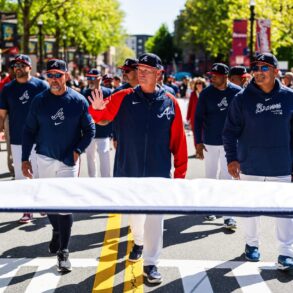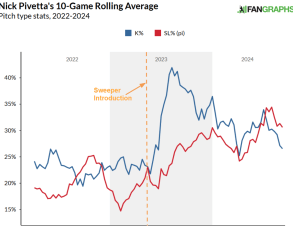A version of this article first appeared in the CNBC Sport newsletter with Alex Sherman, which brings you the biggest news and exclusive interviews from the worlds of sports business and media. Sign up to receive future editions, straight to your inbox. The big sports business story of the past week has been ESPN’s decision to opt out of its Major League Baseball media rights deal, ending a 35-year relationship. For nostalgic MLB fans, the news is shocking. There was a time when ESPN aired six MLB games a week. “Baseball Tonight,” an ESPN highlight show dedicated to MLB, was seemingly ubiquitous during summer nights when a live game wasn’t on the air. But those days haven’t been around for a while. ESPN dropped to three games a week about 20 years ago, and went down to just one a week in 2022. ESPN canceled the weekday and Saturday editions of “Baseball Tonight” in 2017. As of today, there are just 30 regular-season MLB games on ESPN all year. Twenty-five of those are “Sunday Night Baseball.” ESPN also owns the rights to the Home Run Derby and wild-card round playoff games, which are best-of-three affairs. Assuming ESPN and MLB do end their relationship and don’t come back to the negotiating table, I’m told ESPN will need to sign a new deal with the league for access to highlights. The simple explanation for why ESPN opted out on its deal with MLB is straightforward. ESPN was paying $550 million a year for 30 games. Compare that to the $10 million Roku is paying for 18 games or the $85 million Apple TV+ is spending on “Friday Night Baseball,” and it’s pretty easy to see why ESPN doesn’t want to pay $550 million. “Sunday Night Baseball” drew an average of 1.5 million viewers across its 25 games last season, and that was actually the highest average rating in five seasons. Now, juxtapose that against the less than $10 million ESPN is paying for two seasons of TGL, the startup simulated golf league, according to people familiar with the matter. TGL doesn’t average 1.5 million viewers, but Week 2 of the league, which featured Tiger Woods playing, drew more than 1 million viewers, and it’s thus far averaged just over 700,000 through seven weeks. The story here is determining whether MLB is actually at a disadvantage because of its tonnage – the amount of games it’s selling in a package. ESPN doesn’t need to pay hundreds of millions of dollars for 30 regular season baseball games when it can use Sunday nights to elevate the WNBA or promote newer sports that have stronger growth potential and cost far less. This could be a future problem for the National Hockey League, MLS, English Premier League or any non-NBA, non-NFL sport that has a lot of games. Selling big packages of games used to be lucrative for sports leagues because TV networks wanted heft for distribution deals. That still exists for companies like Fox, Paramount Global, which owns CBS, and Comcast’s NBCUniversal — or perhaps even the still-unnamed SpinCo, the new parent company of CNBC that Comcast will spin out later this year. But those companies don’t have as much money to spend on non-premier sports as they once did, both because the stock market hasn’t been particularly kind to many of them and because they’re paying more for the NFL and the NBA than ever before. This applies to ESPN, as well. Sports leagues hope that streamers will be the white knight. MLB is about to find out. Perhaps Amazon or YouTube will come to the rescue and pay MLB a large fee for ESPN’s package. NBC and CBS will likely be interested in MLB because of their broadcast networks, but they’re unlikely to spend anywhere near the $550 million ESPN had been paying. “Do I think baseball will get more for their media rights than what ESPN walked away from? I think the answer is yes,” Fanatics CEO Michael Rubin said Wednesday on CNBC’s “Squawk Box.” “A lot of times you have one person that says ‘this isn’t worth that,’ and then two streamers show up and pay three times that.” Rubin may be right that a streamer will simply pay up because it wants to be in the MLB business. But even if that doesn’t happen, it’s still possible MLB can recoup its money if it’s able to deftly slice and dice its media rights. The best bet for MLB may be to chop up the ESPN package into several different packages, a la what the NFL has done. This is how MLB can possibly attract Netflix and any streamer looking to copy the Netflix strategy. Netflix views tonnage as an unnecessary burden, inflating the cost of sports for little to no payoff. This is why co-CEO Ted Sarandos keeps saying he hasn’t found a logical way in yet to being a full-season owner of sports rights. A random Sunday night baseball game will very easily get lost in the Netflix library. If Netflix wants to shell out hundreds of millions of dollars on programming, it would rather spend it on a new TV series it can own and monetize for years to come, rather than on renting sports. But what is appealing to Netflix is to own an “event” as a way to bring people to the service. This is what the platform has done with the Jake Paul – Mike Tyson fight, or the NFL’s regular season Christmas games, which had higher ratings on Netflix than playoff games did on Amazon or Peacock. It’s why Netflix bought the rights to the 2027 and 2031 FIFA Women’s World Cup. The Home Run Derby is an event. Wild card playoff games can be an event. That may have some interest to Netflix, according to people familiar with the matter. Thirty regular season baseball games are not an event and are of no interest to Netflix, the people said. (By the way – last week , I wrote about Netflix’s Chief Content Officer Bela Bajaria ‘s comment to The Town’s Matt Belloni that she would want Sunday afternoon NFL games if they were available. A curious part of that statement, which was off the cuff and probably not meant to be taken seriously, is that she chose an afternoon package over “Sunday Night Football” or “Monday Night Football.” A full package of Sunday afternoon games doesn’t fit the Netflix strategy, but “SNF” or “MNF” both do. I wonder if Bajaria would change her answer if she were asked the question again. Bela, if you’re reading this, email me!) MLB will likely have to run the math to figure out if it can get more money by separately selling the Home Run Derby, the playoff games, and the regular seasons, or if a buyer will pay up for all three. By at least threatening to carve up the rights, MLB may be able to convince a buyer to pony up more money for the entire package. If not, hey, ESPN Chairman Jimmy Pitaro will be more than willing to pick up the phone again to discuss a new deal – as long as it’s for a lot less money. On the record With Los Angeles Chargers head coach Jim Harbaugh … There are few characters in the NFL world as colorful as Los Angeles Chargers head coach Jim Harbaugh . The Sherman family often quotes one of Harbaugh’s catch phrases, “Who’s got it better than us? Nobody!” as a daily adage, even if somewhat tongue in cheek. (As in: Dad: “Time to go to school!” Kids: “I don’t want to go!” Dad: “Who’s got it better than us?” Kids, annoyed: “Nobody…”) Harbaugh recently left the University of Michigan after winning a national championship. I asked him if NIL is ruining college football, and if the College Football Playoffs are diminishing the value of regular season games like Ohio St. vs. Michigan. “I’m for the playoffs,” Harbaugh said. “Does that devalue the regular season? I don’t think so.” I also asked him if he felt the NFL treated Colin Kaepernick fairly after his controversial kneeling during the national anthem. Harbaugh was Kaepernick’s head coach in the NFL. He once called Kaepernick “Superman.” Did it make any sense that he couldn’t land a job in the league after 2016? I’ll let you watch the full interview to hear his response on that one. Or, listen to it here if you prefer the audio version. Watch the full interview and follow and listen to the new CNBC Sport podcast. CNBC Sport highlight reel The best of CNBC Sport from the past week: CNBC’s Michael Ozanian is out with his latest sports valuations – this time he tackles the NBA. The average NBA team is worth $4.66 billion, according to Ozanian’s proprietary calculations. The most valuable team in 2025 is the Golden State Warriors at $9.4 billion, and the least valuable is the Memphis Grizzlies at $3.2 billion. The full list can be found here . CNBC’s Julia Boorstin spoke with the WNBA’s Breeana Stewart on her new venture, Unrivaled, the three-on-three women’s basketball league. Stewart is one of the co-founders of the league, which last week drew 377,000 viewers on Friday night across TNT and truTV for its inaugural one-on-one tournament, according to Front Office Sports. Amer Sports, which owns sports and outdoor brands including Wilson and Salomon, has been a public company for a full year. Its CEO, James Zheng , joined “Money Movers” to explain his company’s growth prospects. The big number: 9.3 million Holy cow, the NHL struck gold with its “4 Nations Face-Off” tournament. An incredibly high 9.3 million Americans watched the U.S.-Canada final, and another 6.3 million viewers in Canada tuned in. It was the most watched non-Olympic hockey game in the Nielsen era, which began in 1988. To put this in context, the most-watched NHL All-Star game ever was 2.7 million in the U.S. in 2004. The “4 Nations Face-Off” final was watched nearly 3.5x more than the most-watched All-Star game ever. Quote of the week “Rather than addressing concerns, players believed that management responded to feedback by making conditions worse.” – That’s what the National Football League Players Association said about New York Jets owner Woody Johnson and the team’s management in its annual team report cards. The NFLPA surveyed 1,695 players, who gave their teams grades in a variety of categories, including “head coach,” “ownership” and “training room.” The Jets were the only team to receive an F in ownership. A quick congratulations to the Carolina Panthers and Arizona Cardinals on your D-minuses. Around the league NESN, the regional Boston sports network, is doing something that’s almost unheard of in the world of media: it’s lowering the price of its streaming service. A yearly subscription to NESN 360, the regional home of the Boston Red Sox and Boston Bruins, will cost $239.99. That’s down from $329.99, a 27% price reduction. The monthly price remains $29.99 per month. The reduction is evidence that the RSN industry is in flux as it transitions from pay TV to streaming. Clearly, NESN realized there wasn’t enough appetite to pay more than $300 a year – especially when the Red Sox don’t play games for nearly half the year. Manchester United is eliminating 150 to 200 jobs – on top of 250 roles removed last year. “The transformation plan aims to return the club to profitability after five consecutive years of losses since 2019,” the club, which is publicly traded, said in a statement. Shares are down about 20% over the past five years. Warner Bros. Discovery is walking back a plan to tier sports on its streaming service Max. The company said in September 2023 that it planned to charge a $9.99 monthly fee to streaming subscribers who wanted access to live NBA, MLB, NHL and college basketball games (among other sports). Since that time, WBD has lost the live rights to the NBA, beginning next season. That likely contributed to the company’s plans to scrap the idea.
Teoscar Hernández of the Los Angeles Dodgers bats during the T-Mobile Home Run Derby at Globe Life Field on July 15, 2024 in Arlington, Texas.
Sam Hodde | Getty Images Sport | Getty Images
A version of this article first appeared in the CNBC Sport newsletter with Alex Sherman, which brings you the biggest news and exclusive interviews from the worlds of sports business and media. Sign up to receive future editions, straight to your inbox.
The big sports business story of the past week has been ESPN’s decision to opt out of its Major League Baseball media rights deal, ending a 35-year relationship.
For nostalgic MLB fans, the news is shocking. There was a time when ESPN aired six MLB games a week. “Baseball Tonight,” an ESPN highlight show dedicated to MLB, was seemingly ubiquitous during summer nights when a live game wasn’t on the air.
But those days haven’t been around for a while. ESPN dropped to three games a week about 20 years ago, and went down to just one a week in 2022. ESPN canceled the weekday and Saturday editions of “Baseball Tonight” in 2017.
As of today, there are just 30 regular-season MLB games on ESPN all year. Twenty-five of those are “Sunday Night Baseball.” ESPN also owns the rights to the Home Run Derby and wild-card round playoff games, which are best-of-three affairs. Assuming ESPN and MLB do end their relationship and don’t come back to the negotiating table, I’m told ESPN will need to sign a new deal with the league for access to highlights.
The CNBC Sport newsletter with Alex Sherman brings you the biggest news and exclusive interviews from the worlds of sports business and media, delivered weekly to your inbox.
Subscribe here to get access today.
The simple explanation for why ESPN opted out on its deal with MLB is straightforward. ESPN was paying $550 million a year for 30 games. Compare that to the $10 million Roku is paying for 18 games or the $85 million Apple TV+ is spending on “Friday Night Baseball,” and it’s pretty easy to see why ESPN doesn’t want to pay $550 million.
“Sunday Night Baseball” drew an average of 1.5 million viewers across its 25 games last season, and that was actually the highest average rating in five seasons.
Now, juxtapose that against the less than $10 million ESPN is paying for two seasons of TGL, the startup simulated golf league, according to people familiar with the matter. TGL doesn’t average 1.5 million viewers, but Week 2 of the league, which featured Tiger Woods playing, drew more than 1 million viewers, and it’s thus far averaged just over 700,000 through seven weeks.
The story here is determining whether MLB is actually at a disadvantage because of its tonnage – the amount of games it’s selling in a package. ESPN doesn’t need to pay hundreds of millions of dollars for 30 regular season baseball games when it can use Sunday nights to elevate the WNBA or promote newer sports that have stronger growth potential and cost far less.
This could be a future problem for the National Hockey League, MLS, English Premier League or any non-NBA, non-NFL sport that has a lot of games. Selling big packages of games used to be lucrative for sports leagues because TV networks wanted heft for distribution deals. That still exists for companies like Fox, Paramount Global, which owns CBS, and Comcast’s NBCUniversal — or perhaps even the still-unnamed SpinCo, the new parent company of CNBC that Comcast will spin out later this year.
But those companies don’t have as much money to spend on non-premier sports as they once did, both because the stock market hasn’t been particularly kind to many of them and because they’re paying more for the NFL and the NBA than ever before. This applies to ESPN, as well.
Sports leagues hope that streamers will be the white knight. MLB is about to find out. Perhaps Amazon or YouTube will come to the rescue and pay MLB a large fee for ESPN’s package. NBC and CBS will likely be interested in MLB because of their broadcast networks, but they’re unlikely to spend anywhere near the $550 million ESPN had been paying.
“Do I think baseball will get more for their media rights than what ESPN walked away from? I think the answer is yes,” Fanatics CEO Michael Rubin said Wednesday on CNBC’s “Squawk Box.” “A lot of times you have one person that says ‘this isn’t worth that,’ and then two streamers show up and pay three times that.”
Rubin may be right that a streamer will simply pay up because it wants to be in the MLB business. But even if that doesn’t happen, it’s still possible MLB can recoup its money if it’s able to deftly slice and dice its media rights. The best bet for MLB may be to chop up the ESPN package into several different packages, a la what the NFL has done. This is how MLB can possibly attract Netflix and any streamer looking to copy the Netflix strategy.
Netflix views tonnage as an unnecessary burden, inflating the cost of sports for little to no payoff. This is why co-CEO Ted Sarandos keeps saying he hasn’t found a logical way in yet to being a full-season owner of sports rights.
A random Sunday night baseball game will very easily get lost in the Netflix library. If Netflix wants to shell out hundreds of millions of dollars on programming, it would rather spend it on a new TV series it can own and monetize for years to come, rather than on renting sports.
But what is appealing to Netflix is to own an “event” as a way to bring people to the service. This is what the platform has done with the Jake Paul–Mike Tyson fight, or the NFL’s regular season Christmas games, which had higher ratings on Netflix than playoff games did on Amazon or Peacock. It’s why Netflix bought the rights to the 2027 and 2031 FIFA Women’s World Cup.
The Home Run Derby is an event. Wild card playoff games can be an event. That may have some interest to Netflix, according to people familiar with the matter. Thirty regular season baseball games are not an event and are of no interest to Netflix, the people said.
(By the way – last week, I wrote about Netflix’s Chief Content Officer Bela Bajaria‘s comment to The Town’s Matt Belloni that she would want Sunday afternoon NFL games if they were available. A curious part of that statement, which was off the cuff and probably not meant to be taken seriously, is that she chose an afternoon package over “Sunday Night Football” or “Monday Night Football.” A full package of Sunday afternoon games doesn’t fit the Netflix strategy, but “SNF” or “MNF” both do. I wonder if Bajaria would change her answer if she were asked the question again. Bela, if you’re reading this, email me!)
MLB will likely have to run the math to figure out if it can get more money by separately selling the Home Run Derby, the playoff games, and the regular seasons, or if a buyer will pay up for all three.
By at least threatening to carve up the rights, MLB may be able to convince a buyer to pony up more money for the entire package.
If not, hey, ESPN Chairman Jimmy Pitaro will be more than willing to pick up the phone again to discuss a new deal – as long as it’s for a lot less money.
On the record
With Los Angeles Chargers head coach Jim Harbaugh …










